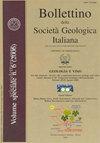Geochemical characterisation of the alkaline and hyperalkaline groundwater in the Othrys Ophiolite Massif, central Greece
引用次数: 5
Abstract
The complex geology of Greece includes two important parallel running ophiolitic belts. The Othrys Massif in central Greece belongs to the westernmost of them. In the current study, 33 water samples from cold hyperalkaline and hypothermal (T < 40°C) alkaline springs and 30 gas samples (either dissolved or free) were collected at 17 different sites in and around this wide ophiolite outcrop, aiming to determine the origin of fluids and evidence gas-water-rock interaction processes taking place in the area. Water samples were analysed for their chemical (major ions and trace elements) and isotope (δ18O-H2O, δ2H-H2O) composition. They can be subdivided into alkaline (pH 11 and Ca-OH composition). Trace elements generally showed very low concentrations and mostly inversely correlated with pH. Gases were analysed for their chemical (He, Ne, Ar, H2, O2, N2, CH4, C2H6, CO2 and H2S) and isotope (δ13C-CH4, δ2H-CH4, δ13C-CO2) composition. Samples from alkaline waters were mainly dominated by CH4 (from 128,000 to 915,000 μmol/mol), while hyperalkaline waters showed a N2-rich composition (from 727,000 to 977,000 μmol/mol). Methane had a wide range of isotope compositions (δ13C-CH4 from -74.5 to -14.5 ‰ and δ2H-CH4 from -343 to -62 ‰). Alkaline waters present the most negative isotope values for CH4, evidencing a biogenic (both thermogenic and microbial) origin. Many of the hyperalkaline waters had CH4 isotope values compatible with an abiogenic origin through serpentinization processes but occasionaly very negative values were recorded, indicating sometimes a clear biogenic contribution. Finally, few samples both from alkaline and hyperalkaline waters showed some evidence of secondary oxidation processes.希腊中部Othrys蛇绿岩地块碱性和高碱性地下水地球化学特征
希腊复杂的地质包括两条重要的平行运行蛇绿岩带。希腊中部的奥斯里斯山脉属于它们的最西端。在目前的研究中,在这一广泛的蛇绿岩露头内及其周围的17个不同地点收集了33个来自冷高碱性和低温(T < 40°C)碱性泉的水样和30个气体样品(溶解或游离),旨在确定流体的起源,并证明该地区发生的气-水-岩相互作用过程。分析了水样的化学成分(主要离子和微量元素)和同位素(δ18O-H2O, δ2H-H2O)组成。它们可细分为碱性(pH值为11)和Ca-OH组成。微量元素的浓度普遍很低,且与ph呈负相关。气体的化学成分(He、Ne、Ar、H2、O2、N2、CH4、C2H6、CO2和H2S)和同位素(δ13C-CH4、δ2H-CH4、δ13C-CO2)组成进行了分析。碱性水体以CH4(12.8万~ 91.5万μmol/mol)为主,高碱性水体以n2(72.7万~ 977000 μmol/mol)为主。甲烷的同位素组成范围较广(δ13C-CH4为-74.5 ~ -14.5‰,δ2H-CH4为-343 ~ -62‰)。碱性水体CH4的负同位素值最大,表明其生物成因(热成因和微生物成因)。许多高碱性水体的CH4同位素值与蛇纹岩化过程的非生物成因相一致,但偶尔记录到非常负的值,表明有时有明显的生物成因贡献。最后,在碱性和高碱性水体中均有少量样品显示出二次氧化过程的证据。
本文章由计算机程序翻译,如有差异,请以英文原文为准。
求助全文
约1分钟内获得全文
求助全文

 求助内容:
求助内容: 应助结果提醒方式:
应助结果提醒方式:


